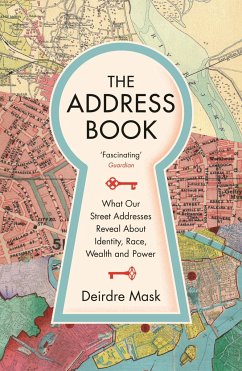§Longlisted for the Jhalak Prize 2021
A TIME Magazine Must-Read Book of 2020
Shortlisted for the Katharine Briggs Award 2020
'Deirdre Mask's book was just up my Strasse, alley, avenue and boulevard.' -Simon Garfield, author of Just My Type
'Fascinating ... intelligent but thoroughly accessible ... full of surprises' - Sunday Times
When most people think about street addresses they think of parcel deliveries, or visitors finding their way. But who numbered the first house, and where, and why? What can addresses tell us about who we are and how we live together?
Deirdre Mask looks at the fate of streets named after Martin Luther King, Jr., how ancient Romans found their way, and why Bobby Sands is memorialised in Tehran. She explores why it matters if, like millions of people today, you don't have an address.
From cholera epidemics to tax hungry monarchs, Mask discovers the different ways street names are created, celebrated, and in some cases, banned. Full of eye-opening facts, fascinating people and hidden history, this book shows how addresses are about identity, class and race. But most of all they are about power: the power to name, to hide, to decide who counts, who doesn't, and why.
'A must read for urbanists and all those interested in cities and modern economic and social life.' - Richard Florida, author of The Rise of the Creative Class
A TIME Magazine Must-Read Book of 2020
Shortlisted for the Katharine Briggs Award 2020
'Deirdre Mask's book was just up my Strasse, alley, avenue and boulevard.' -Simon Garfield, author of Just My Type
'Fascinating ... intelligent but thoroughly accessible ... full of surprises' - Sunday Times
When most people think about street addresses they think of parcel deliveries, or visitors finding their way. But who numbered the first house, and where, and why? What can addresses tell us about who we are and how we live together?
Deirdre Mask looks at the fate of streets named after Martin Luther King, Jr., how ancient Romans found their way, and why Bobby Sands is memorialised in Tehran. She explores why it matters if, like millions of people today, you don't have an address.
From cholera epidemics to tax hungry monarchs, Mask discovers the different ways street names are created, celebrated, and in some cases, banned. Full of eye-opening facts, fascinating people and hidden history, this book shows how addresses are about identity, class and race. But most of all they are about power: the power to name, to hide, to decide who counts, who doesn't, and why.
'A must read for urbanists and all those interested in cities and modern economic and social life.' - Richard Florida, author of The Rise of the Creative Class








